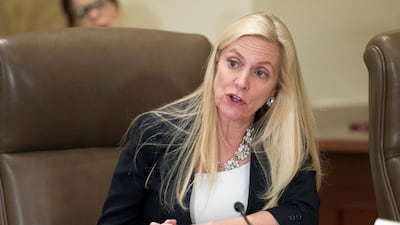The US economy will recover more slowly than expected amid a surge in novel coronavirus cases across the country, and a broad second wave of the disease could cause economic pain to deepen again, Federal Reserve officials warned on Tuesday.
One by one, Fed policymakers have become more downbeat in recent days, resetting expectations on the recovery and cautioning that recent improvements in economic data such as job gains may be fleeting.
“The pandemic remains the key driver of the economy’s course. A thick fog of uncertainty still surrounds us, and downside risks predominate,” Fed governor Lael Brainard said in a speech to a virtual event hosted by the National Association for Business Economics.
She called on the US central bank to commit to providing sustained accommodation through forward guidance and large-scale asset purchases. Additional fiscal support would be “vital” to the strength of the recovery – particularly with the first round of pandemic economic support programmes expiring soon, she said.
Since March, the Fed has slashed interest rates to near zero, ramped up large-scale asset purchases and launched numerous other crisis programmes designed to grease the US financial system and funnel credit to households and businesses.
US coronavirus cases rose in 46 out of 50 states last week and deaths rose nationally for the first time since mid-April, according to a Reuters analysis.
The president of the Richmond Fed, Thomas Barkin, warned on Tuesday that US unemployment could rise again as businesses adjust to a recession likely to be longer than first anticipated and initiatives like the Paycheck Protection Program (PPP) expire.
“A bunch of companies large and small are realising this is not a two-month issue and recasting their business,” possibly jeopardising two strong months of job growth, Mr Barkin said in webcast remarks to the Charlotte Rotary Club.
Small-business recipients of PPP loans that may have kept employees on to meet the terms of loan forgiveness may now consider laying them off as the programme expires and demand remains weak.
Robert Kaplan, president of the Dallas Fed, speaking on CNBC, cited “lots of overcapacity in the economy”, which he called “disinflationary”.
Fed officials, after initially hoping the virus would be brought swiftly under control in the US to allow the economy to bounce back quickly, admitted that the forecasts for economic growth made at their last policy meeting in June largely did not factor in the possibility of a second wave.
The renewed surge in cases has prompted some states to dial back or pause reopenings at a time when other advanced nations around the world have been able to reopen their economies more sustainably due to successful mitigation strategies.
Philadelphia Fed president Patrick Harker, also at the webinar organised by the Fed, said the increase in cases could cause more damage to the economy and to consumer confidence.
James Bullard, the St. Louis Fed president, sounded a somewhat optimistic note, saying his base case is the economy continues to grow in the second half of the year, but still offered caution.
“The downside risk is nevertheless substantial, and better execution of a granular, risk-based policy will be critical to keep the economy out of depression,” Mr Bullard said in comments to the Economic Club of New York. He expects Congress to approve a “substantial” new fiscal package to keep households and businesses stable by the end of the month.
Ms Brainard warned that a broad second wave of infections could even prompt a second dip in activity as well as reignite financial market volatility at a time of greater vulnerability.
“Non-bank financial institutions could again come under pressure ... and some banks might pull back on lending if they face rising losses,” ms Brainard said.

